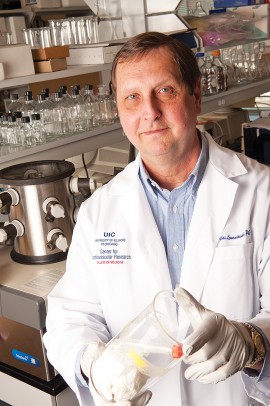Focus on the heart

E. Douglas Lewandowski: “If you really want to understand the fundamental process of disease, you have to crawl inside the cell.”
Photo: Roberta Dupuis-Devlin/UIC Photo Services
The University Scholars Program, now in its 28th year, honors faculty members for superior research and teaching, along with great promise for future achievements. The award provides $10,000 a year for three years.
By seventh grade, E. Douglas Lewandowski knew he wanted to be either a scientist, a point guard or a center fielder.
Science won. Lewandowski, professor of physiology and biophysics and medicine and adjunct professor of bioengineering, is director of the Center for Cardiovascular Research in the College of Medicine.
He oversees a research program that focuses on the metabolic basis of heart disease.
“In the past five to seven years, what we’ve found with our focus in heart failure is that there’s a tremendous importance now in how the heart both uses and stores fat inside the actual heart muscle cells,” he said.
When he joined UIC in 2000, Lewandowski was “already well recognized as a leader in the fields of cardiac metabolism and physiology and in cardiovascular magnetic resonance,” said R. John Solaro, head of physiology and biophysics.
After a B.A. in biology at the University of Chicago and an M.S. in physiology and biophysics at Urbana-Champaign, Lewandowski completed a Ph.D. in radiological sciences from the University of Texas Southwestern Medical School. He joined the cardiology faculty at the Baylor College of Medicine at age 28, avoiding a postdoc.
“It really helped me maintain an edge among basic scientists because I cut my teeth in a clinical department,” he said. “One of the things that I really appreciated was how the clinical faculty respected the Ph.Ds for their expertise, and we respected them for their clinical insights.”
Lewandowski pioneered the use of a stable isotope, carbon-13, as a tracer that can be seen with nuclear magnetic resonance to examine metabolic rates in a beating heart.
As a result, he received the first Young Investigator Award from the International Society of Magnetic Resonance in Medicine. He was recruited to Harvard, where he used NMR to study the enzymes that regulate metabolic pathways by delivering genes to the heart. “If you really want to understand the fundamental process of disease, you have to crawl inside the cell,” he said.
Researchers from all over the world are interested in his work, because some of the methods his lab developed to study biochemical reactions inside a beating, functioning heart can only be done here.
Lewandowski said he’ll use his University Scholar prize to support his students’ travel for professional development.
One of his sons is a UIC medical student, the other a musician. He himself has several guitars, “each of which I play equally poorly.”
Other University Scholars:
Michael Cho tinkers with biology
Vladimir Gevorgyan simplifies complexities
Constantine Megaridis changes interactions
